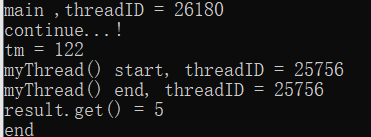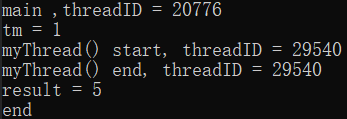1、async
async是一个函数模板,用来启动一个异步任务,启动异步任务后,返回一个future对象。这个future对象里含有线程入口函数锁返回的结果(线程返回结果),可通过future对象的成员函数get()来获取。
2、future
(1)future:
将来的意思,提供了一种访问异步操作结果的机制,此结果可能没马上拿到,可在线程执行完毕后拿到结果,该结果可使用future类中get()函数来获取。
(2)launch::deferred和launch::async
launch::deferred:表示线程入口函数调用被延迟到future的wait()或者get()调用时才执行 若wait()或get()没调用,那么线程是不执行的,并且没创建新线程,是在主线程中调用线程入口函数。
launch::async:在调用async函数时立刻开始创建线程async()函数默认使用launch::async,所以一般省略此参数。
例
#include <iostream>
#include <string>
#include <thread>
#include <mutex>
#include <future>
using namespace std;
class A
{
public:
A() {}
~A() {}
int myThread(int tm)
{
cout << "tm = " << tm << endl;
cout << "myThread() start, threadID = " << this_thread::get_id() << endl;
chrono::microseconds dura(5000); // 定义时长,5秒
this_thread::sleep_for(dura); // 休眠一定时长
cout << "myThread() end, threadID = " << this_thread::get_id() << endl;
return 5;
}
};
int main()
{
A a;
int tm = 122;
cout << "main ,threadID = " << this_thread::get_id() << endl;
future<int> result = async(&A::myThread, a, tm); // 马上调用
// future<int> result = async(launch::async , &A::myThread, a, tm);
// future<int> result = async(launch::deferred , &A::myThread, a, tm); // 延迟调用
cout << "continue...!" << endl;
int def;
def = 0;
cout << "result.get() = "<< result.get() << endl; // 流程卡在此等待线程返回,get()只能调一次不能多次调用,如果不等待获取可能会执行混乱
// result.wait(); // 等待线程返回,本身并不返回结果
cout << "end" << endl;
system("pause");
return 0;
}
输出:

3、packaged_task
packaged_task:打包任务,把任务包装起来,是一个类模板,模板参数是各种可调用对象,通过packaged_task来把各种可执行对象包装起来,方便将来作为线程入。packaged_task包装起来的可调用对象也可直接调用。
(1)使用普通函数
#include <iostream>
#include <string>
#include <thread>
#include <mutex>
#include <future>
using namespace std;
int myThread(int tm)
{
cout << "tm = " << tm << endl;
cout << "myThread() start, threadID = " << this_thread::get_id() << endl;
chrono::microseconds dura(5000); // 定义时长,5秒
this_thread::sleep_for(dura); // 休眠一定时长
cout << "myThread() end, threadID = " << this_thread::get_id() << endl;
return 5;
}
int main()
{
cout << "main ,threadID = " << this_thread::get_id() << endl;
packaged_task<int(int)> myPt(myThread); // 将mymyThread通过packaged_task包装起来,后续可直接使用包装起来的对象
thread t1(ref(myPt), 1); // 线程直接开始执行,第二个参数作为线程入口函数参数
t1.join(); // 等待线程执行结束
future<int> result = myPt.get_future(); // furure对象里含线程入口函数的返回值,此处result保存的是myThread的返回值
cout << "result = " << result.get() << endl;
cout << "end" << endl;
system("pause");
return 0;
}
输出:

(2)使用lambda表达式:
#include <iostream>
#include <string>
#include <thread>
#include <mutex>
#include <future>
using namespace std;
int main()
{
packaged_task<int(int)> myPt([](int tm) {
cout << "tm = " << tm << endl;
cout << "myThread() start, threadID = " << this_thread::get_id() << endl;
chrono::microseconds dura(5000); // 定义时长,5秒
this_thread::sleep_for(dura); // 休眠一定时长
cout << "myThread() end, threadID = " << this_thread::get_id() << endl;
return 5;
});
thread t1(ref(myPt), 1); // 线程直接开始执行,第二个参数作为线程入口函数参数
t1.join(); // 等待线程执行结束
future<int> result = myPt.get_future(); // furure对象里含线程入口函数的返回值,此处result保存的是myThread的返回值
cout << "result = " << result.get() << endl;
cout << "end" << endl;
// 直接调用
//myPt(66);
//future<int> result2 = myPt.get_future();
//cout << "result2 = " << result2.get() << endl;
system("pause");
return 0;
}
(3)使用容器:
#include <iostream>
#include <string>
#include <thread>
#include <mutex>
#include <future>
using namespace std;
vector <packaged_task<int(int)>> myTask;
int main()
{
packaged_task<int(int)> myPt([](int tm) {
cout << "tm = " << tm << endl;
cout << "myThread() start, threadID = " << this_thread::get_id() << endl;
chrono::microseconds dura(5000); // 定义时长,5秒
this_thread::sleep_for(dura); // 休眠一定时长
cout << "myThread() end, threadID = " << this_thread::get_id() << endl;
return 5;
});
cout << "main ,threadID = " << this_thread::get_id() << endl;
myTask.push_back(move(myPt));
packaged_task<int(int)> myPt2;
auto it = myTask.begin();
myPt2 = move(*it);
myTask.erase(it); // 删除第一个元素,迭代器已实现,故后续代码不能再使用it
myPt2(123);
future<int> result3 = myPt2.get_future();
cout << "result3 = " << result3.get() << endl;
system("pause");
return 0;
}
输出:

4、promise
promise:类模板,可在某个线程中给它赋值,然后在其他线程中,把这个值取出来用,可用于线程之间的数据传递。具体做法是通过promise保存一个值,在将来某时刻通过把一个future绑定到这个promise上,以获取promise上绑定的值
例:
#include <iostream>
#include <string>
#include <thread>
#include <mutex>
#include <future>
using namespace std;
void myThread(promise<int> &tmp, int calc)
{
// 做一系列复杂操作
calc++;
calc *= 10;
chrono::microseconds dura(5000); // 定义时长,5秒
this_thread::sleep_for(dura); // 休眠一定时长
int result = calc;
tmp.set_value(result); // 结果保存在tmp中
cout << "myThread1 result = " << result << endl;
}
void myThread2(future<int> &tm)
{
auto result = tm.get();
cout << "myThread2 result = " << result << endl;
}
int main()
{
promise<int> myPro;
thread t1(myThread, ref(myPro), 99);
t1.join();
// 获取结果值
future<int> fut = myPro.get_future(); // promise和future绑定,用于获取线程返回值
// auto result = fut.get(); // get()只能调用一次
// cout << "result = " << result << endl;
thread t2(myThread2, ref(fut));
t2.join();
cout << "end" << endl;
system("pause");
return 0;
}
输出:

